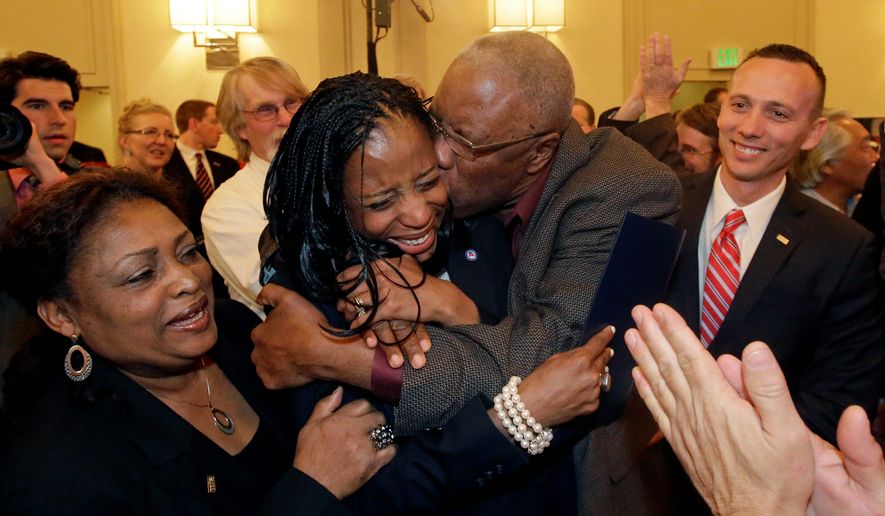From the first female black Republican ever elected to Congress to the first woman combat veteran to serve in the Senate, voters Tuesday injected a wave of fresh faces into American politics, helping to soften the GOP’s image as the party of cranky old white men, and anointing a galaxy of new political stars likely to have an immediate impact in Washington.
Mia Love, a Haitian-American Mormon, will become the first black GOP woman to serve in Congress after she won a House seat in Utah on her second try. And the decisive Senate win by Joni Ernst, a lieutenant colonel in the Iowa Army National Guard who served in Kuwait during Operation Iraqi Freedom, makes her the first woman who’s served in combat to reach the upper chamber.
Nebraska voters chose Ben Sasse as their next senator, tapping a former Bush administration health official who analysts say has both D.C. experience and outsider appeal to be a national voice.
Mr. Sasse, 42, is part of a new class of younger GOP lawmakers who are highly educated and experienced but can still appeal to voters in a “down-home way,” said Lara Brown, an associate professor at the Graduate School of Political Management at George Washington University.
“Ben Sasse has essentially all the credentials and more than [Texas GOP Sen.] Ted Cruz had, and yet his entire message wasn’t confrontational or negative,” she said. “Ben Sasse instead wanted to talk about how to get things done, not just how to obstruct things.”
Other up-and-comers in the 2015 GOP freshman class include Elise Stefanik, at 30 the youngest woman ever elected to Congress. Ms. Stefanik, a former aide in the George W. Bush White House, won a seat in a traditionally blue New York district. Joining her will be Rep.-elect Will Hurd, a black Republican and former undercover CIA officer who unseated incumbent Rep. Pete P. Gallego in a key swing district in Texas.
PHOTOS: GOP's new stars break mold, refresh Republican brand
Other fresh faces: In Arkansas, Rep. Tom Cotton, a 37-year-old former Army captain who was awarded the Bronze Star, overcame a visit from former President Bill Clinton to defeat Democratic Sen. Mark L. Pryor, while South Carolina Sen. Tim Scott, appointed to his seat two years ago, won election in his own right to become the first black candidate to be elected to statewide office in the South since Reconstruction and the first ever black senator elected in South Carolina.
Larry Hogan, elected governor of Maryland in a major upset, became the new face of tax revolt after campaigning with laser focus against Democratic Gov. Martin O’Malley’s tax hikes.
And Republicans could add an openly gay member to their House ranks if Carl DeMaio’s tiny lead against Democratic Rep. Scott H. Peters in a San Diego district holds up.
Reaching new audiences
Several of the new GOP stars appeared to appreciate what they were bringing to the GOP brand.
Mr. Sasse summed up his approach to politics in his victory speech Tuesday night, saying he’d vowed to himself that he’d only run if he could do it boldly.
“We were only going to run if we could go big on ideas, such that our campaign, which started with 3 percent name ID, would either catch fire or we were going to fail in spectacular fashion. And frankly, we were OK with that,” he said.
He also delivered part of his speech in Spanish to appeal to Hispanic voters, underscoring another part of his unorthodox campaign. Even after winning the GOP primary, virtually assuring he would win the Senate seat in deep-red Nebraska, Mr. Sasse sought out Latino voters who might not be part of the usual GOP coalition.
He said Republicans need to appeal to people of all races on a variety of issues that are important to them, and for Hispanics that means going beyond just immigration.
In her own victory speech, Ms. Ernst, who made headlines early in the campaign by running an ad touting her farm-girl experience castrating pigs as training for Washington, said it’s time to make good on that promise.
“We are going to make ’em squeal,” she told supporters Tuesday, repeating the signature line from her viral ad.
Ms. Ernst also recalled her quintessential Iowa upbringing, including memories of her mother wrapping plastic bread bags over her shoes on rainy school days.
“It wasn’t high fashion,” she recalled, “but every day, when I got on the school bus, there were rows and rows and rows of kids with bread bags on their feet. These were the sons and daughters of hard-working Iowa.”
Many of the newly elected GOP stars promoted a message of cooperation, promising to be accountable to voters at home and work across the aisle to break gridlock.
“I will work with anyone regardless of their party affiliation to get it done,” Ms. Stefanik told Time Warner Cable News in central New York. “Republicans, Democrats, independents, even Green Party members. If you have a good idea, I’m willing to work with you to get the job done.”
Ms. Stefanik, like many in the new class of GOP winners on election night, has an impressive resume, including a degree from Harvard to go with her stint in the White House.
“The Republicans got the candidates they wanted,” Ms. Brown said of this year’s class. “They got highly credentialed, strategic, strong candidates, and many of these people were more able to connect with voters in terms of their frustration with Washington.”
• Jacqueline Klimas can be reached at jklimas@washingtontimes.com.




Please read our comment policy before commenting.